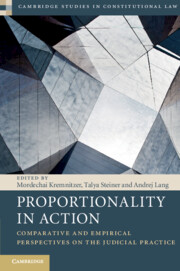Book contents
- Proportionality in Action
- Cambridge Studies in Constitutional Law
- Proportionality in Action
- Copyright page
- Contents
- Figures
- Tables
- Contributors
- Preface
- Cases
- Introduction
- 1 Proportionality Analysis by the German Federal Constitutional Court
- 2 Proportionality Analysis by the Canadian Supreme Court
- 3 Proportionality Analysis by the South African Constitutional Court
- 4 Proportionality Analysis by the Israeli Supreme Court
- 5 Proportionality Analysis by the Polish Constitutional Tribunal
- 6 Limitation Analysis by the Indian Supreme Court
- 7 Comparative and Empirical Insights into Judicial Practice
- Index
Introduction
Analysing Proportionality Comparatively and Empirically
Published online by Cambridge University Press: 14 April 2020
- Proportionality in Action
- Cambridge Studies in Constitutional Law
- Proportionality in Action
- Copyright page
- Contents
- Figures
- Tables
- Contributors
- Preface
- Cases
- Introduction
- 1 Proportionality Analysis by the German Federal Constitutional Court
- 2 Proportionality Analysis by the Canadian Supreme Court
- 3 Proportionality Analysis by the South African Constitutional Court
- 4 Proportionality Analysis by the Israeli Supreme Court
- 5 Proportionality Analysis by the Polish Constitutional Tribunal
- 6 Limitation Analysis by the Indian Supreme Court
- 7 Comparative and Empirical Insights into Judicial Practice
- Index
Summary
The introduction sets out an overview of different strands and developments in the scholarship on proportionality, demonstrating that the majority of previous approaches are normative in nature. Against this background, the introduction points to the advantages of learning more about the nuanced ways in which proportionality is actually applied in judicial practice. It argues for a comparative inquiry of proportionality aimed at the differences and similarities between countries. It also emphasizes the potential of an empirical approach to constitutional scholarship to better ground normative debates on the actual judicial practice. The introduction describes the book's research design and methodology, and lays out the book's goals: to contribute to the understanding of the global constitutional phenomenon of proportionality by taking an empirical and comparative approach; to provide an empirically grounded, doctrinally thorough descriptive account of the diverse practices of proportionality in action by six apex courts; to challenge some of the prevalent assumptions about proportionality and enrich the normative debate by providing fresh basis for argument regarding the doctrine's optimal model of application.
Keywords
- Type
- Chapter
- Information
- Proportionality in ActionComparative and Empirical Perspectives on the Judicial Practice, pp. 1 - 21Publisher: Cambridge University PressPrint publication year: 2020



